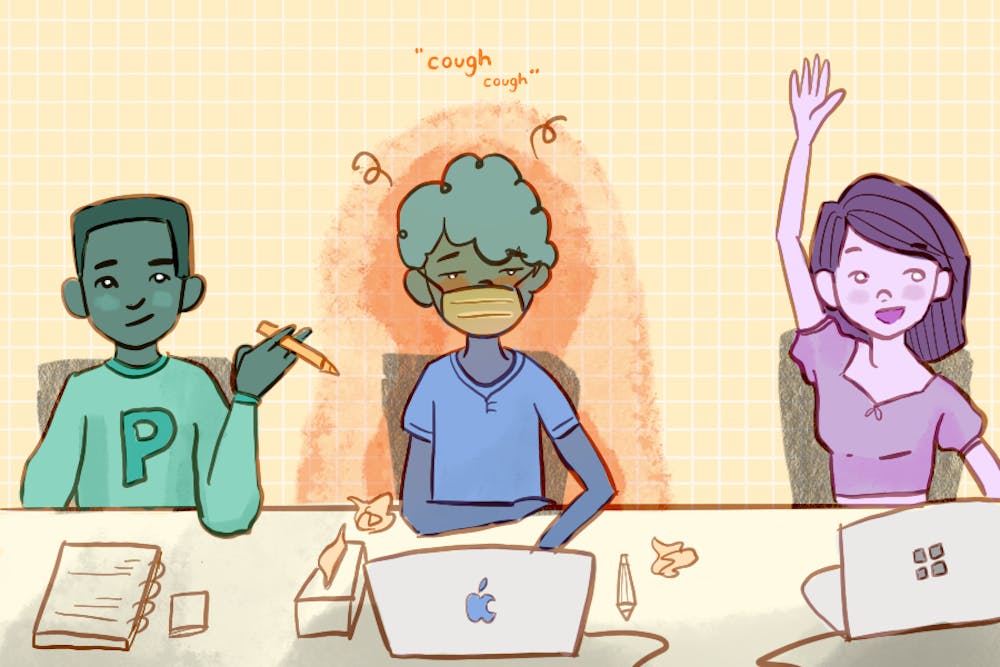Earlier this week, Penn suspended University travel to several countries affected by the coronavirus outbreak, including China, South Korea, Iran, and Italy. Since coronavirus was declared an international public health emergency by the World Health Organization in January, concerns have been picking up around Penn.
Penn-affiliated individuals receive regular updates on the University’s response to the virus from Provost Wendell Pritchett. Some recent updates included a suggestion to rethink international travel over spring break, the creation of a University-wide task force, and a recommendation that anyone not feeling well should stay home.
In light of these concerns, Penn professors and academic departments should be more lenient about sick days, both with class and on-campus jobs. Many of the updates on coronavirus disseminated to the University community contain one standing recommendation: Stay home if you feel sick.
Self-isolation is the recommended course of action for anyone experiencing flu-like symptoms, whether due to possible coronavirus or to other illnesses. But the demands placed on college students make self-isolation difficult, particularly with reference to course absence policies.
Penn must address this tension in order to contain the spread of illness and promote students' well-being.
Professors form their own absence policies at Penn, and some are stricter than others. Some professors mandate that students can only miss a certain number of classes or else their grades will be reduced. Even if professors leave room for special circumstances which may arise, the documentation needed to prove these special circumstances varies not just from department to department, but often from professor to professor.
If a student were to self-isolate due to symptoms but not a diagnosis, they might fail to meet the standard for a course absence.
Even when professors are lenient with absences, students may feel they cannot miss a class due to the volume of makeup work required, as well as the stress of explaining a potentially undiagnosed sickness to a professor. This practice of students attending class even while feeling ill puts classmates, faculty, staff, and neighbors at risk.
SEE MORE FROM THE DAILY PENNSYLVANIAN EDITORIAL BOARD:
NCAA sanctions against Allen unfairly hurt Penn men's basketball
To combat this, Penn should work to standardize professor absence policies and implement a minimum number of sick days required for each course.
This principle of flexibility extends not just to classes at Penn, but also to work-study and other on-campus jobs. The New York Times Editorial Board recently made a similar argument on a national scale, advocating for paid sick leave to combat coronavirus concerns. The Mar. 3 editorial states: “The problem now and going forward is making sure that sick workers stay home. That means not forcing employees to choose between penury and working while coughing.”
Students with work-study jobs often have hours requirements on which their financial aid is contingent. And they often need the money they make from on-campus jobs for food security, paying rent, and the many other expenses that come with attending Penn. With hourly pay and no paid sick leave, these students are disincentivized from prioritizing not just their own health, but also the health of their coworkers and the people with whom they come in contact. Giving students more options for sick leave could help address these concerns.
This issue is not just limited to the recent coronavirus outbreak. On any college campus, students share living spaces, eating spaces, and classrooms. Containing a spread of illness, whether it is hand, foot, and mouth disease, mumps, or influenza, becomes more difficult in a confined campus area. And to better incentivize self-care and self-isolation of sick students during illnesses, Penn needs to be more lenient on sick days.
If Penn wants to prove its commitment not only to coronavirus prevention but also to protecting students’ health in the long-term, sick leave policies must be standardized, well-communicated, and adaptable to fit students’ needs.
Editorials represent the majority view of members of The Daily Pennsylvanian, Inc. Editorial Board, which meets regularly to discuss issues relevant to Penn's campus. Participants in these meetings are not involved in the reporting of articles on related topics.
SEE MORE FROM THE DAILY PENNSYLVANIAN EDITORIAL BOARD:
NCAA sanctions against Allen unfairly hurt Penn men's basketball









